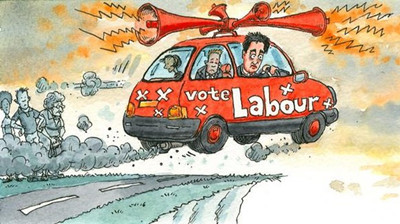The Labour Party's funk

Yet Labour's polling lead over the Conservative Party is slipping. According to YouGov it has fallen from an average of seven points in November to two-and-a-half points in May so far. It is quite possible that the populist right-wing UK Independence Party will beat Labour to first place in elections to the European Parliament on May 22nd (see next story). Not long ago Labour staffers were confidently describing the European vote as a dry run for the general election, due to be held in a year's time.
譯文屬譯生譯世











